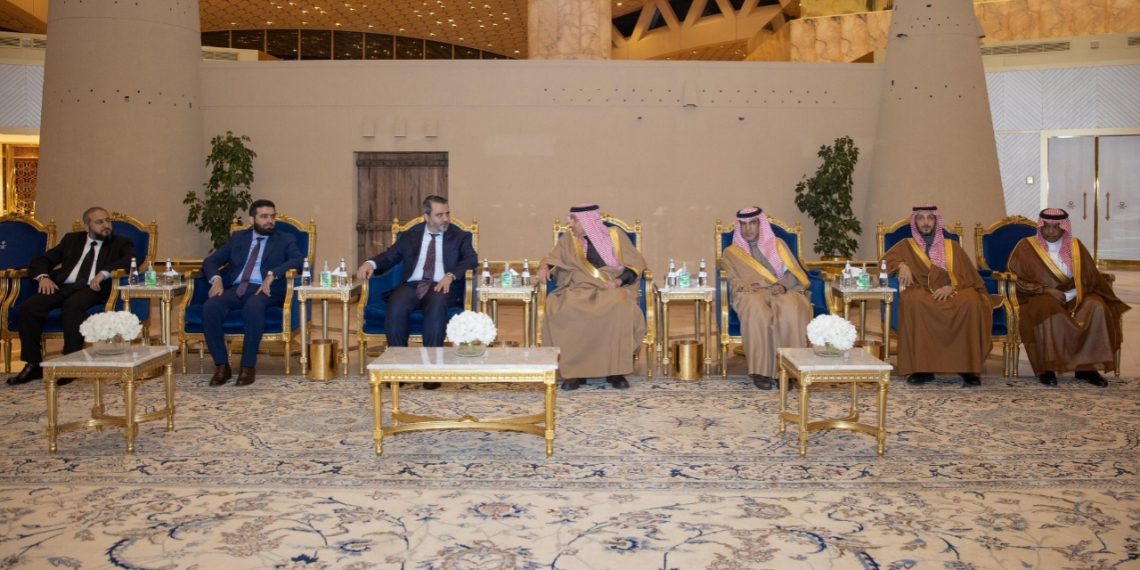In a significant step toward redefining Syrian-Saudi relations, Saudi Foreign Minister Prince Faisal bin Farhan expressed cautious optimism following a visit by a Syrian delegation to the Kingdom. He emphasized the importance of international support in rebuilding Syria while advocating for the removal of sanctions that hinder progress. Despite the new Syrian government’s demonstrated willingness to reform and engage with the global community, analysts note that substantial challenges remain.
Saudi-Syrian relations have experienced a turning point with the early January visit of a delegation from the new Syrian administration to Saudi Arabia. This visit, marking mutual openness, aimed to bridge historical divides and foster cooperation. High-level discussions during the visit reflected both optimism and caution, focusing on regional stability and the reconstruction of Syria.
Speaking at a Davos panel, Prince Faisal expressed his tempered optimism about collaboration with Syria’s new administration, which has inherited a nation in a state of near-total collapse. “I am cautious and cautiously optimistic because we have a new administration that is talking and acting in the right way,” he said. “They have a great opportunity to move Syria onto a positive path, and we need patience and help in this process. The international community has to react and support this administration, because building a country from scratch is not an easy task.”
He also underscored the urgency of removing sanctions to accelerate Syria’s reconstruction, predicting tangible benefits from swift international support.
Syrian Vision: A Comprehensive Development Partnership
Asaad al-Shibani, Foreign Minister of the Syrian Interim Administration, expressed gratitude for Saudi support, describing the visit as an opportunity to present a national vision for rebuilding Syria. On the platform X, Shibani wrote: “We conveyed our national vision to establish an inclusive government and launch an economic development plan that supports investment and strategic partnerships. We also expressed our desire for Syria to play a positive role in the region and promote security and stability alongside Arab countries.”
Shibani highlighted Saudi Arabia’s readiness to assist in Syria’s resurgence and territorial unification, framing this partnership as a real opportunity to improve living standards and public services for the Syrian people.
Political analyst Jawdat al-Jiran noted the broader implications of Saudi support for Syria’s new administration. “Saudi support signifies a shift in regional policy toward reintegrating Syria into its Arab neighborhood,” he told 963+. However, al-Jiran emphasized the need for radical reforms to address the complexity of Syria’s regional entanglements and international interests.
“Political and economic reforms are the greatest challenges,” al-Jiran added. “Western sanctions still impede investment flows, and international confidence in Damascus remains limited. Yet, with concerted international efforts, including those of Saudi Arabia, there is potential for improvement.”
He also pointed out that Saudi Arabia could play a pivotal role in restoring Syria’s regional prominence. “This will require international coordination and clear political priorities, particularly given the influence of Iran and Russia’s military presence in Syria,” he said.
Saudi Arabia’s Pivotal Role
The Syrian Defense Minister described Saudi Arabia as a cornerstone for regional stability and a key partner in strengthening Arab cooperation. “The Kingdom has set a model for supporting affected Arab nations through strategic visions aimed at reconstruction and development,” the minister said.
He acknowledged Saudi Arabia’s humanitarian aid and diplomatic efforts to lift international sanctions, calling the partnership an essential avenue for Syria to regain its regional role. “The Syrian leadership values Saudi Arabia’s supportive stance,” he stated, concluding that the partnership will “open new horizons for cooperation, fostering security, stability, and development in Syria and the broader region.”
Ahmed Ajaj, a professor of international relations in London, concurred, describing Saudi Arabia as Syria’s most strategic ally in the post-crisis era. “Saudi Arabia is not only providing economic support but also working to reshape regional dynamics through this partnership,” Ajaj told 963+.
Ajaj stressed that cooperation with Saudi Arabia hinges on Syria demonstrating genuine commitment to reforms. “Sanctions and political challenges remain significant obstacles. However, sustained internal stability will encourage international investment in reconstruction. The Kingdom is closely monitoring Syria’s progress on these fronts.”
Ajaj also emphasized Saudi Arabia’s role in rearranging regional alliances, suggesting this could help Syria reclaim its Arab identity amid evolving political landscapes, such as the withdrawal of certain regional powers.
Prospects for Partnership
Observers agree that Syrian-Saudi relations are entering a transformative phase of cooperation. Saudi Arabia is poised to lead reconstruction efforts and reintegrate Syria into its Arab neighborhood. As momentum builds toward lifting international sanctions and fostering strategic partnerships, comprehensive reforms will be crucial to ensuring the success of this collaboration.
Statements from both sides underscore that the Saudi-Syrian partnership is not merely a political option but a strategic imperative for regional stability and progress. Saudi Arabia’s vision and leadership suggest a determination to turn Syria into a model of recovery and reform, advancing the interests of the Syrian people while solidifying its role as an influential regional power.
This article was translated and edited by The Syrian Observer. The Syrian Observer has not verified the content of this story. Responsibility for the information and views set out in this article lies entirely with the author.


